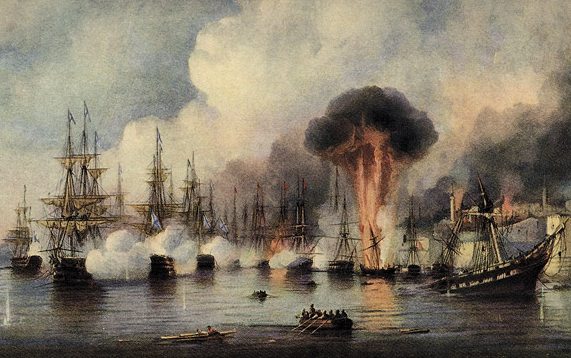|
|||
|
Philatelia.Net / Fragments of Russian History / Plots / The directory «Plots»1853/1856. Crimean WarWar between Russia on the one hand and the Ottoman Empire, England, France, and Sardinia on the other. The causes of the conflict were inherent in the unsolved Eastern Question. The more immediate occasion was a dispute between Russia and France over the Palestinian holy places. Challenging the claim of Russia to guardianship of the holy places, France in 1852 secured from Sultan Abd al-Majid certain privileges for the Latin churches. Russian counterdemands were turned down (1853) by the Ottoman government. In July, 1853, Russia retorted by occupying the Ottoman vassal states of Moldavia and Walachia, and in October, after futile negotiations, the Ottomans declared war. In Mar., 1854, England and France, having already dispatched fleets to the Black Sea, declared war on Russia; Sardinia followed suit in Jan., 1855. Austria remained neutral, but by threatening to enter the war on the Ottoman side forced Russia to evacuate Moldavia and Walachia, which were occupied (Aug., 1854) by Austrian troops. In Sept., 1854, allied troops landed in the Crimea, with the object of capturing Sevastopol. The Russian fortress, defended by Totleben, resisted heroically until Sept., 1855. Allied commanders were Lord Raglan for the British and Marshal Saint-Arnaud, succeeded later by Marshal Canrobert, for the French. Military operations, which were marked on both sides by great stubbornness, gallantry, and disregard for casualties, remained localized. Famous episodes were the battles of Balaklava and Inkerman (1854) and the allied capture (1855) of Malakhov and Redan, which preceded the fall of Sevastopol. On the Asian front the Russians gained advantages and occupied Kars. The accession (1855) of Czar Alexander II and the capture of Sevastopol led to peace negotiations that resulted (Feb., 1856) in the Treaty of Paris. The Crimean War ended the dominant role of Russia in SE Europe; the cooling of Austro-Russian relations was an important factor in subsequent European history. The scandalous treatment of the troops, particularly the wounded, depicted by war correspondents, prompted the work of Florence Nightingale, which was perhaps the most positive result of the war. Solomon Islands, 2006, Queen Victoria awarding first Victoria Crosses Great Britain, 1970.04.01, Great Britain, 2004.10.12, Great Britain, 2004.10.12, Great Britain, 2004.10.12, Great Britain, 2004.10.12, Great Britain, 2004.10.12, Great Britain, 2004.10.12, Great Britain, 2004.10.12, Great Britain, 2004.10.12, Great Britain, 2004.10.12, Great Britain, 2004.10.12, Great Britain, 2004.10.12, Great Britain, 2004.10.12, Great Britain, 2004.10.12, Great Britain, 2004.10.12, Great Britain, 2004.10.12, Advertising: |
|||
© 2003-2024 Dmitry Karasyuk. Idea, preparation, drawing up
|

